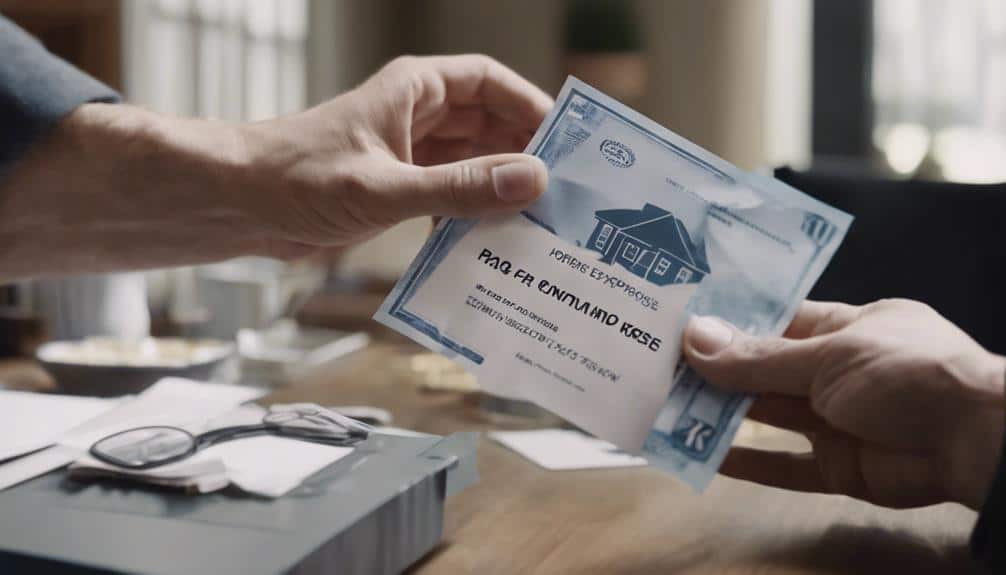Essential Points to RememberKey Takeaways
- Earnest money is a deposit made to demonstrate a buyer’s commitment and can range from 1-3% of the home purchase price.
- This deposit can be applied towards a down payment or closing costs, potentially impacting your overall real estate expenses.
- The amount of earnest money is negotiable and can be influenced by market conditions, potentially making your offer more competitive.
- If contingencies are met, the earnest money is refundable, safeguarding the buyer’s initial investment in the property.
Understanding Earnest Money
Earnest money is fundamentally a good faith deposit, typically 1% to 3% of the home purchase price, demonstrating a buyer’s serious commitment to purchasing the property. Essentially, it is an integral part of property costs, which are placed into an escrow account following the signing of the purchase agreement.
This earnest money can be applied towards the down payment or closing costs at the end of the transaction, providing a financial advantage to the buyer. In competitive markets, especially in a seller’s market, more extensive earnest money deposits can make a buyer’s offer more appealing to sellers, showcasing the buyer’s intent and financial stability.
However, including contingencies in the purchase agreement is vital to protect earnest money. These conditions provide circumstances under which the buyer can withdraw from the deal without losing their deposit, such as failure to secure financing or significant issues revealed during a home inspection. By understanding the function and importance of earnest money, buyers can navigate the complexities of the home purchase process with confidence and security.
Earnest Money vs. Down Payment
In the complex maze of home buying, distinguishing between earnest money and down payment, two critical financial commitments, can significantly enhance a buyer’s understanding and ability to navigate the process. Earnest money and down payments play pivotal roles in home buying, which impacts authentic estate costs in distinct ways.
Earnest money is a smaller upfront payment that signifies a buyer’s commitment to buying the property. Typically, it ranges from 1% to 3% of the home purchase price and is held in escrow until closing. On the other hand, the down payment is a much larger financial commitment, ranging from 3% to 20% of the total home purchase price, due at closing.
Understanding these differences is vital for a prospective homeowner. The earnest money demonstrates your serious intent to purchase, providing the seller security, while the down payment directly reduces the mortgage loan amount. Clarifying these financial aspects can lead to a smoother, more successful buying process.
How Earnest Money Works

Let’s take a closer look at how earnest money works in a real estate transaction. Earnest money, often called a “good faith” deposit, is an upfront payment a buyer offers to show their commitment to purchasing a property. This deposit is usually 1% to 3% of the purchase price, though the exact amount can vary depending on market conditions and the seller’s preferences.
Once a homebuyer makes an offer that the seller accepts, the earnest money is placed into an escrow account. This protects both parties since a neutral third party holds the money until the transaction is finalized. The earnest money deposit can then be applied towards the buyer’s down payment or closing costs.
The earnest money is typically refundable to the buyer if the sale falls through due to contingencies outlined in the purchase agreement, such as home inspection or financing issues. This guarantees the buyer doesn’t lose their deposit in unforeseen circumstances.
| Buyer | Seller | Escrow Account |
|---|---|---|
| Demonstrates commitment to deposit | Receives deposit as reassurance | Holds funds until closing |
| Can apply the deposit towards closing costs | Protected from insincere buyers | Neutral third party |
| Deposit refundable in case of contingencies | Encouraged by the buyer’s commitment | Ensures equitable handling of funds |
| Amount varies based on market conditions | Has assurance of buyer’s sincerity | Releases funds upon agreement |
| Engages in earnest money exchange as part of the buying process | Can rely on deposit as part of the selling process | Facilitates transactions between buyer and seller |
Calculating Earnest Money Amount
While earnest money might seem straightforward, calculating the exact amount to offer can be influenced by several factors, including the home’s purchase price, current market conditions, and the seller’s preferences. The range of earnest money typically falls between 1% to 3% of the purchase price. In a market with intense competition, an attractive offer might include a higher earnest money deposit to show commitment and stand out among other potential buyers.
The earnest money deposit is negotiable. While calculating earnest money, it’s essential to carefully consider how much you’re willing and able to offer. Offering a higher amount can show the seller you are serious about the purchase and committed to following through. However, it’s vital to balance this commitment with your financial capabilities.
For instance, if you’re looking at a $300,000 house, the earnest money could range from $3,000 to $9,000. Market conditions and seller preferences can influence this range. In a seller’s market, you might need to offer more to make your offer competitive. Conversely, in a buyer’s market, you might be able to negotiate a lower amount.
Importance of Earnest Money

Earnest money’s significance in the property transaction process cannot be overstated. It serves as a tangible demonstration of a buyer’s dedication and seriousness about purchasing a home. This financial commitment provides sellers with security, knowing that the buyer is invested in the transaction and is not likely to back out without cause.
In a competitive real estate market, earnest money can make a buyer’s offer more attractive. By offering a higher earnest money deposit, a buyer signals their strong intent to purchase, potentially leading the seller to favor their offer over others.
However, buyers must understand their obligations. Failure to fulfill the terms of the purchase agreement can result in the loss of this earnest money, protecting the seller.
| Keyword | Importance | Context |
|---|---|---|
| Money (Earnest) | Crucial | It serves as a security deposit demonstrating the buyer’s commitment |
| Seriousness | Essential | It is the earnest money that reflects the buyer’s intent |
| Protection | Key | Earnest money safeguards the seller against unjust withdrawal |
| Attractive Offer | Important | Higher earnest money can make a buyer’s offer stand out |
| Obligations | Necessary | Non-compliance can result in the loss of earnest money |
Refund Policies for Earnest Money
Potential buyers must grasp the importance of earnest money refundability. This mainly depends on certain contingencies outlined in the purchase agreement, such as appraisal, home inspection, and financing approval. Hence, understanding these contingencies and the specific refund terms can safeguard a buyer’s earnest money in property transactions.
Earnest Money Refundability
Exploring the complexities of earnest money refundability offers prospective homeowners a safeguard, ensuring they are protected should specific contingencies detailed in the purchase agreement fail to materialize. The earnest money deposit, often a substantial sum, is at stake. It is essential to understand how to protect your earnest money and under what circumstances it can be refunded.
Common contingencies that may allow you to get your earnest money back include issues with financing, home appraisal, or other stipulations outlined in the purchase agreement. For instance, a financing contingency permits the buyer to back out and reclaim their earnest money if they fail to secure necessary financing. Similarly, the deal may falter if the home appraisal falls short of the purchase price, triggering earnest money refundability.
Understanding these contingencies and how they impact earnest money refundability is crucial. If the deal falls through due to unmet contingencies, the earnest money can be refunded to the buyer. However, without these safeguards, prospective homeowners risk losing their earnest money. Therefore, an informed understanding of earnest money refundability is essential in any property transaction.
Contingencies and Refunds
Understanding the complexities of refund policies for earnest money is a crucial aspect of home buying. It provides a safety net for buyers should specific contingencies in the purchase agreement remain unfulfilled. Earnest money can be significant; hence, knowing when it’s refundable is crucial for financial planning.
Typical contingencies include home inspection, title search, and appraisal. A home inspection contingency, for example, allows buyers to renegotiate or withdraw from the agreement if serious issues are found during the inspection. Similarly, a title search contingency protects buyers if legal problems with the property title arise, allowing them to walk away without financial penalties.
Refunds of earnest money largely depend on these conditions set in the purchase agreement. If these contingencies are unmet, the earnest money is refundable, providing a financial buffer for buyers. Hence, understanding these contingencies is not just about protecting your significant amount of earnest money; it’s about ensuring your entire investment is safeguarded. It emphasizes the need for buyers to know the purchase agreement’s specifics and negotiate contingencies that protect their interests.
Post-Offer Expenses in Real Estate

Exploring post-offer expenses in the estate realm is critical to homebuying. Understanding the key components, such as home inspection costs, title search fees, and closing costs, provides potential homeowners with a clear financial picture. This knowledge allows buyers to budget effectively and make informed decisions, ensuring a smooth transaction and avoiding unexpected expenses.
Home Inspection Costs
While purchasing a home involves various financial considerations, one crucial post-offer expense that buyers must prepare for is the home inspection cost, which typically ranges from $300 to $500, depending on the size and location of the property. This expense is critical as it can uncover potential issues, such as structural problems or needed repairs, that could significantly impact the buyer’s purchase decision.
Potential homeowners must budget for home inspection costs for their overall investment strategy. While it may seem like an additional expense, this cost is a valuable investment that ensures the property is in good condition and helps avoid unexpected expenses later on.
Home inspection costs are typically paid out of pocket, separate from the earnest money deposit and closing costs. Neglecting this expense could lead to a financial surprise that strains your budget. Therefore, it’s prudent to factor in these costs early in the buying process. Investing in a thorough home inspection can provide peace of mind and secure a sound financial future in your new property.
Title Search Fees
Another significant post-offer expense that prospective homeowners should anticipate is the title search fee. This fee is necessary to investigate the property’s title history and confirm unambiguous ownership. It is a critical component of property transactions, safeguarding the buyer’s interests and ensuring a smooth handover of ownership.
Title search fees are essential for several reasons:
- They thoroughly investigate the property’s title history, revealing any potential obstacles to clear ownership.
- They uncover any outstanding liens or ownership issues that could impact the buyer’s legal rights.
- The title search helps buyers avoid costly surprises after finalizing the property transaction.
- Though an additional cost, title search fees grant buyers peace of mind by confirming the absence of undisclosed claims or disputes.
Understanding Closing Costs
Often underestimated, closing costs are a substantial aspect of post-offer expenses in estate transactions. They typically range from 2% to 5% of the home purchase price and cover fees like appraisal, title insurance, and attorney services. These costs can easily add to a homebuyer’s financial burdens if not adequately anticipated and included in the budgeting process.
Understanding the intricacies of closing costs is crucial to navigating a property transaction smoothly. For instance, these costs can vary significantly based on the property’s location and the buyer’s chosen loan type. Hence, thoroughly understanding these variances can help potential homeowners plan their budgets more effectively and avoid unexpected expenses.
Moreover, closing costs are not just add-ons but essential components of the transaction, ensuring the legal and financial soundness of the process. Thus, they should be treated equally as the down payment.
Down Payment Explained
To comprehend the financial intricacies of purchasing a home, it’s fundamental to understand the concept of a down payment. A down payment is a substantial sum, typically from 3% to 20% of the home’s purchase price, paid upfront at closing. This down payment is determined by various factors, including your chosen loan program and the lender’s requirements.
As a buyer, it’s important to note that the down payment is separate from the earnest money deposit and is not refundable, as it directly contributes to the home’s total purchase price. This initial investment increases your equity in the property from the outset and can significantly reduce long-term interest costs.
To offer more insight into the down payment concept, consider the following key points:
- The size of the down payment can influence the loan program eligibility.
- Lender requirements vary, hence the down payment range.
- Down payments are refundable and reduce the total purchase price.
- Government-backed programs like USDA and FHA offer zero-down or low-down payment options.
Understanding these points can better prepare you for this essential step in the homebuying process.
Comparing Earnest Money and Down Payment.

Having grasped the concept of down payment, it’s equally important to understand and compare it with earnest money, another critical financial component of home buying. Earnhomebuyingmebuying, typically 1-3% of the purchase price, is paid upfront when making an offer. This payment is held in escrow, serving as a clear demonstration of your commitment to the transaction. It is essential in property expenses as it reassures the seller of your serious intent to purchase.
Contrastingly, the down payment is a more significant sum, generally 3-20% of the purchase price, paid at the transaction’s closing. Unlike earnest money, which shows intent, the down payment is a tangible contribution towards the home’s purchase price, reducing the amount you’ll need to borrow.
Thus, while both payments are integral to the business, the buyiEarnest money is a smaller deposit reflecting commitment. In contrast, the down payment is significant to the actual home cost. Understanding these differences can help streamline the homebuying experience and potentially lower overall property expenses.
Frequently Asked Questions
Will real estate earnest money increase the price of the home, or is it refundable?
Real estate earnest money does not increase the price of the home. It is typically refundable if the deal falls through due to reasons outlined in the purchase contract, such as failing inspections or financing issues.
Is Earnest Money Part of the Purchase Price?
Yes, earnest money is part of the purchase price. It serves as a deposit made by the buyer, demonstrating commitment, and is typically applied towards the down payment at closing, directly reducing property costs.
Does Earnest Money Make a Difference?
Yes, earnest money indeed makes a significant difference. It demonstrates a buyer’s serious intent, enhances the attractiveness of an offer, and can be pivotal in securing a deal in a competitive property market.
Why Do Sellers Care About Earnest Money?
Sellers value earnest money, demonstrating a buyer’s commitment to the transaction. It offers protection against buyers reneging and can influence a seller’s decision. It’s a sign of the buyer’s financial capability and dedication.
What Typically Happens to Earnest Money?
Earnest money typically lands in an escrow account for safekeeping until closing. The sale proceeds are then used towards the down payment or closing costs. If not, the purchase agreement dictates its distribution.
Conclusion
Understanding the correlation between earnest money and down payments is crucial in the property market. These financial aspects significantly impact a property deal’s overall cost and transactional dynamics. Hence, being well-informed about these terms can offer strategic advantages in property negotiations, potentially saving significant money and mitigating financial risks. Ultimately, earnest money is not just a simple deposit; it’s a strategic tool in the sophisticated world of property transactions.







